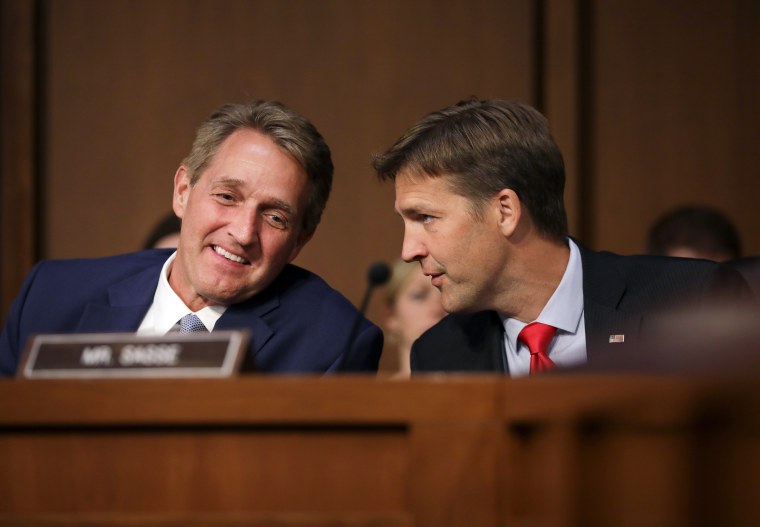Over the weekend, Sen. Ben Sasse of Nebraska, a frequent critic of President Donald Trump, mused that he regularly considersleaving the Republican Party. Sasse’s reflections may be borne of stylistic differences and genuine concern for the Republic. However, based on his voting record (87 percent in agreement with Trump) his threatened departure from the GOP doesn’t feel based in policy or a weakening of his conservative beliefs.
Today, being a Republican means lining up behind the president, all day and always, regardless of his actions, comments or baser instincts. It’s the unfortunate, new political reality that Republicans operate within. But when Sasse says he may not be a Republican anymore, that doesn’t mean he’s given up on conservatism. It is far more believable that the junior senator from Nebraska sees the Republican Party as having left him, not the other way around.
After seeing Sasse’s comments, I tweeted that he should indeed leave the GOP (as I did two years ago). Immediately, two California Republicans took me to task for suggesting that Sasse has any better future outside the two-party monopoly than he has within it. And herein lies part of the problem. If Sasse is, as he says, truly concerned about how the country is being governed, he is exactly the kind of person who could actually help do something about it — both with his votes and by putting pressure on party leadership. If he wants to.
But does he want to? Sasse is certainly not the first Republican senator to critique the president. Outgoing Sens. Jeff Flake, R-Ariz., and Bob Corker, R-Tenn., have taken explicitly anti-Trump stands, showing their disdain (and acceptance of political reality) by deciding not to seek re-election. But for all their rhetoric, neither Flake nor Corker appear to have consistently challenged the White House’s agenda, put pressure on Senate Majority Leader Mitch McConnell or mounted much concrete public opposition. In fact, the fact that they aren't even trying to get re-elected doesn't exactly inspire confidence in their stand. Fiery speeches aside, at some point the Sasses, Flakes and Corkers of the world are going to have to do more than be the Boys Who Cried Donald.
Sasse’s frustration is not limited to just his own party. When discussing the two-party monopoly, Sasse stated: “I don’t think either party can articulate a vision for America that’s five or 10 years future looking right now. … So when you ask the American people ‘Do you identify more with the Republican Party or the Democratic Party?’ and if you don’t give them the option to say ‘none of the above’ 46 percent of people still interrupt to say ‘none of the above.’”
Indeed, according to a Gallup survey conducted last fall,61 percent of Americans said they believe the U.S. needs a new political party. But what would that party look like? Would it take a page from the Republicans of 1854, who split off from an existing party (the Whigs) because they could no longer stand the scourge of slavery? Is it a rump party made up of simply Never-Trump conservatives, destined to never garner more than 15 percent of the vote in a national election?
Whatever America’s next political movement looks like, it will need leaders like Sasse to shed their partisan skin for a new home, and a new mission.
The answer is: It’s too early to tell. However, whatever America’s next political movement looks like, it will need leaders like Sasse to shed their partisan skin for a new home, and a new mission — one dedicated to putting people first and “red and blue jerseys” a distant second. It will take leaders who understand that outside the Beltway, politics is far more than just a “heads I win, tails you lose” zero-sum game in which, whatever the political, policy or legislative outcome, the system, broken as it is, will continue to roll on.
Luckily for the country, and perhaps for skeptics like Sasse, there is a groundswell of independents, reformers and new party creators who are organizing themselves to try and support this new movement. Their mission is difficult, but not impossible. Their goals lay, as Sasse points out, not in the next election cycle, but in the next decade and the next century.
Just as the GOP and the Democrats face their own internal, existential struggles, those looking to build new political pathways and coalitions will have to contend with similar distrust of history, motives and outcomes. That these forces are growing, moving and coalescing at all is a testament both to the need for such efforts and the current chaos and dysfunction of our politics.
Ben Sasse says he wakes up every morning and asks himself whether he wants to remain a Republican. Millions of Americans have asked themselves that same question about their own political membership — and they have taken the first, most difficult step of deciding to detach themselves from the matrix that is the Republican and Democratic duopoly.
But Sasse is still a member of the GOP, and one who votes with the president the vast majority of the time. Real change will not come from disaffected Republicans complaining about the state of their party. If they want to make a difference, a real difference, they’re going to have to take that first step into political space and trust that there are plenty of people out there ready to catch them.
